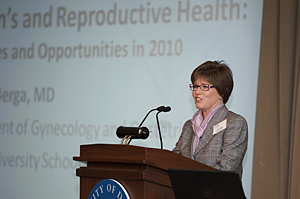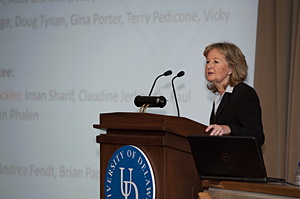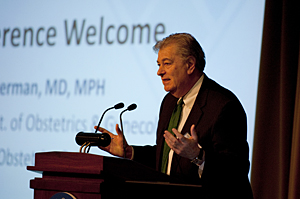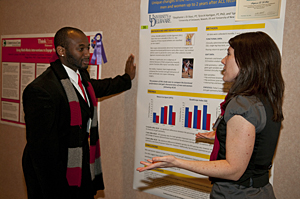

ADVERTISEMENT
- Rozovsky wins prestigious NSF Early Career Award
- UD students meet alumni, experience 'closing bell' at NYSE
- Newark Police seek assistance in identifying suspects in robbery
- Rivlin says bipartisan budget action, stronger budget rules key to reversing debt
- Stink bugs shouldn't pose problem until late summer
- Gao to honor Placido Domingo in Washington performance
- Adopt-A-Highway project keeps Lewes road clean
- WVUD's Radiothon fundraiser runs April 1-10
- W.D. Snodgrass Symposium to honor Pulitzer winner
- New guide helps cancer patients manage symptoms
- UD in the News, March 25, 2011
- For the Record, March 25, 2011
- Public opinion expert discusses world views of U.S. in Global Agenda series
- Congressional delegation, dean laud Center for Community Research and Service program
- Center for Political Communication sets symposium on politics, entertainment
- Students work to raise funds, awareness of domestic violence
- Equestrian team wins regional championship in Western riding
- Markell, Harker stress importance of agriculture to Delaware's economy
- Carol A. Ammon MBA Case Competition winners announced
- Prof presents blood-clotting studies at Gordon Research Conference
- Sexual Assault Awareness Month events, programs announced
- Stay connected with Sea Grant, CEOE e-newsletter
- A message to UD regarding the tragedy in Japan
- More News >>
- March 31-May 14: REP stages Neil Simon's 'The Good Doctor'
- April 2: Newark plans annual 'wine and dine'
- April 5: Expert perspective on U.S. health care
- April 5: Comedian Ace Guillen to visit Scrounge
- April 6, May 4: School of Nursing sponsors research lecture series
- April 6-May 4: Confucius Institute presents Chinese Film Series on Wednesdays
- April 6: IPCC's Pachauri to discuss sustainable development in DENIN Dialogue Series
- April 7: 'WVUDstock' radiothon concert announced
- April 8: English Language Institute presents 'Arts in Translation'
- April 9: Green and Healthy Living Expo planned at The Bob
- April 9: Center for Political Communication to host Onion editor
- April 10: Alumni Easter Egg-stravaganza planned
- April 11: CDS session to focus on visual assistive technologies
- April 12: T.J. Stiles to speak at UDLA annual dinner
- April 15, 16: Annual UD push lawnmower tune-up scheduled
- April 15, 16: Master Players series presents iMusic 4, China Magpie
- April 15, 16: Delaware Symphony, UD chorus to perform Mahler work
- April 18: Former NFL Coach Bill Cowher featured in UD Speaks
- April 21-24: Sesame Street Live brings Elmo and friends to The Bob
- April 30: Save the date for Ag Day 2011 at UD
- April 30: Symposium to consider 'Frontiers at the Chemistry-Biology Interface'
- April 30-May 1: Relay for Life set at Delaware Field House
- May 4: Delaware Membrane Protein Symposium announced
- May 5: Northwestern University's Leon Keer to deliver Kerr lecture
- May 7: Women's volleyball team to host second annual Spring Fling
- Through May 3: SPPA announces speakers for 10th annual lecture series
- Through May 4: Global Agenda sees U.S. through others' eyes; World Bank president to speak
- Through May 4: 'Research on Race, Ethnicity, Culture' topic of series
- Through May 9: Black American Studies announces lecture series
- Through May 11: 'Challenges in Jewish Culture' lecture series announced
- Through May 11: Area Studies research featured in speaker series
- Through June 5: 'Andy Warhol: Behind the Camera' on view in Old College Gallery
- Through July 15: 'Bodyscapes' on view at Mechanical Hall Gallery
- More What's Happening >>
- UD calendar >>
- Middle States evaluation team on campus April 5
- Phipps named HR Liaison of the Quarter
- Senior wins iPad for participating in assessment study
- April 19: Procurement Services schedules information sessions
- UD Bookstore announces spring break hours
- HealthyU Wellness Program encourages employees to 'Step into Spring'
- April 8-29: Faculty roundtable series considers student engagement
- GRE is changing; learn more at April 15 info session
- April 30: UD Evening with Blue Rocks set for employees
- Morris Library to be open 24/7 during final exams
- More Campus FYI >>
2:47 p.m., Dec. 13, 2010----More than 250 people representing some 20 health-related professions attended a conference addressing women and children's health research at the University of Delaware on Friday, Dec. 10.
The meeting was sponsored by the Delaware Health Sciences Alliance (DHSA) and organized by Richard Derman, M.D., chair of the Department of Obstetrics and Gynecology at Christiana Care Health System (CCHS), and Kathleen Matt, dean of the UD College of Health Sciences and executive director of DHSA.
“This is an opportunity to form new collaborative teams under the DHSA umbrella,” said Derman. “We want to make certain that women and children's health is a key component of the DHSA research portfolio.”
Derman said that the goals for the meeting were to find common ground for future formalized collaborations, to prioritize areas of research where there is an established critical mass, and to support state and community needs by addressing critical questions that affect health outcomes.
Matt emphasized that interdisciplinary research and interprofessional education are critical to continued progress in improving women and children's health worldwide.
The presidents of the four DHSA institutions spoke before and during lunch. All noted that the emerging alliance is having an impact on the lives of individuals and making a significant difference in the state.
“We're taking our innate compassion and developing research to serve the community,” said CCHS president Robert Laskowski. “We can use science to make a difference.”
Keynote on reproductive health
Sarah Berga, M.D., the James Robert McCord Professor and Chair of Reproductive Endocrinology and Infertility at Emory University School of Medicine, delivered the keynote talk, “Women's and Reproductive Health: Challenges and Opportunities,” in the morning and a community lecture in the evening.
Challenges she cited include maternal mortality, substandard adolescent reproductive health, affordability and access, and a highly variable level of health literacy.
“We have come to expect safe outcomes for wanted pregnancies in countries like the United States,” Berga said, “but we forget that pregnancy is still a serious medical state that has to be managed.”
According to Berga, the U.S. is first in the world in healthcare spending but only 33rd in maternal mortality. “We have many disenfranchised people because of the economics of caring for them,” she said. “A market-driven healthcare system like ours doesn't guarantee that the money goes where the need is. In effect, our economic system, which is characterized by very high economic disparity, forges illness.”
“This is why people have become very interested in social determinants of health,” she added. “We have to determine how we can redistribute the resources we have so they do the most good.”
Berga also highlighted some of her research on reproductive function. “The intrauterine milieu programs cells and gene expression, thereby imprinting the next generation,” she said. “Social and dietary influences play major roles in determining which genes are available for expression. If we take care of women during pregnancy, we're setting up the next generation for better health.”
Plenary presentations
Six brief plenary presentations addressed topics ranging from infant mobility and language development to global health. Despite the diversity of the speakers' backgrounds and topics, common themes emerged.
In many areas -- for example, nutrition and obesity -- knowledge exists about what needs to be done, but there is a lack of information on how best to implement needed programs.
Speakers also noted that while high-tech developments have reduced maternal and infant mortality in developed nations, many solutions to accomplish the same goal in developing countries are available and inexpensive. For example, a drug to treat post-partum hemorrhage can now be administered for 12 cents a dose, while low-cost clean cookstoves can significantly reduce deaths in poor nations, where women typically cook over open fires in enclosed spaces with babies and young children nearby.
Early intervention was the message when it comes to children. Play and exploration of the environment are important for infant development. Language and social skills are core abilities for success in school and society, and language and literacy contribute significantly to health outcomes.
In addition, a number of speakers addressed the importance of considering culturally relevant issues not only in developing countries but also in working with minority populations within this country.
Breakout and poster sessions
Breakout sessions addressed community-based participatory research, global health, cardiovascular health, maternal/child health, cancer, adolescent health, behavioral health, and health services delivery.
Sixty-three posters were featured at the conference, with awards given for the top entry in each of four areas:
Perinatal health -- Factors Influencing Acceptance of H1N1 Influenza Vaccine in Pregnancy (Marci Drees, CCHS).
Pediatrics -- Factors Influencing Physical Activity in Children with Autism Spectrum Disorders (Iva Obrusnikova, UD).
Adolescent/public health -- Unique Changes in the Functional Status and Gait Behaviors Between Men and Women up to Two Years After ACL Reconstruction (Stephanie Stasi, UD).
Adult women's health -- Purinergic Receptors in Triple-Negative Breast Cancer Cell Lines (Jomnarong Lertsuwan, UD).
Article by Diane Kukich
Photos by Kathy Atkinson, Ambre Alexander and Doug Baker




